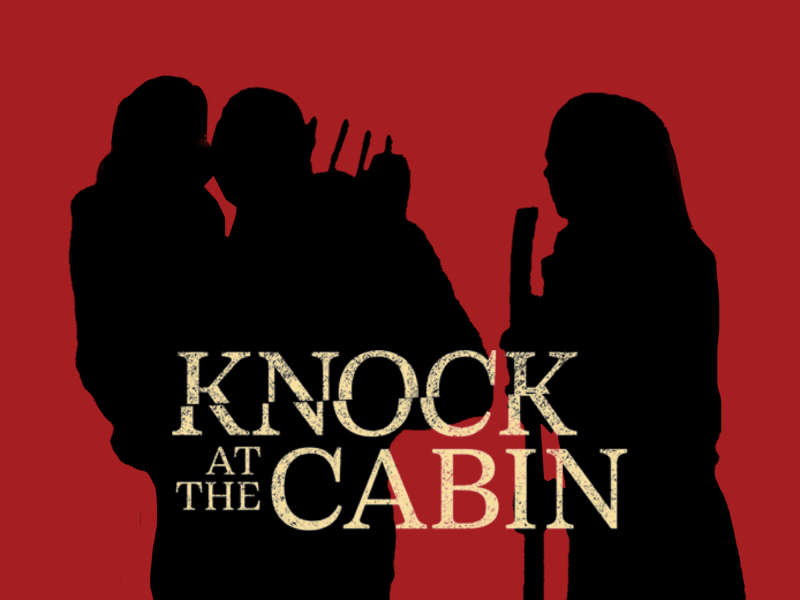Warning: this review contains spoilers.
Having made movies like “The Sixth Sense” and “The Village,” M. Night Shyamalan is a modern thriller legend. This talent makes his latest flop — “Knock at the Cabin” — all the more disappointing.
At first, the film seemed to have promise. It follows the story of a couple (Eric and Andrew) and their child (Wen) staying at an idyllic cabin in the woods, when four strangers (Leonard, Sabrina, Adrian and Redmond) knock on their door. The strangers present them with an impossible choice: the family must willingly sacrifice one of its members or the world will end. The film is essentially an adaptation of the trolley problem in psychology and ethics.
The cast inspired hope. Jonathan Groff, whom I’ve loved since my angsty “Spring Awakening” days, plays Eric. Dave Bautista, whom you may know from “Guardians of the Galaxy” but really shines in “My Spy,” plays Leonard. Perhaps the real tragedy of “Knock at the Cabin” is that it had so much promise yet still ended up a desolate disappointment.
Imagine that feeling you get on a roller coaster: your stomach tightens as you get towards the top, ready for it to drop. “Knock at the Cabin” was like that, but the drop never came. I sat there, waiting for the twist to hit, but instead was left with an unsatisfying and seemingly unfinished movie.
The film successfully builds apprehension, at least in its first half. For example, as the four visitors pressure the family to choose their sacrifice, Andrew realizes that he recognizes Redmond. Years ago, Redmond had beat Andrew up for being gay. After Andrew has this realization, the apocalypse group reveals that Redmond was the one who brought them all together through a chatroom.
With this new information, we want to assume that the visitors are delusional. The news thus plants a seed of doubt: maybe the apocalypse isn’t happening? On the flip side, when planes start dropping from the sky like dead birds, it seems like the group’s apocalypse theory may not be so ridiculous after all. For a bit, at least, we are left in Shyamalan’s signature pit of unease, not knowing who to trust.
He throws all of that hard work away, though, with the movie’s ending. Instead of pulling the rug out from under us, the film goes exactly where you’d expect: the apocalypse is real, and Eric decides to sacrifice himself. This anticlimactic ending made the rest of the movie feel like a giant waste of time and made me question the film’s claim of fitting in the “Mystery” genre. This is all the more disappointing when we learn that the movie’s source material, a book called “The Cabin at the End of the World,” has a much more thrilling ending.
Without mystery, “Knock at the Cabin” just seems bland. A straightforward trolley problem is not original enough to stand on its own, and the layering of social commentary seems half-baked and out of place. Throughout the movie, we see flashbacks of Eric and Andrew’s relationship, showcasing both their love and moments where they faced homophobia, such as when Andrew’s parents refused to accept their relationship or when they couple to lie about being brothers to adopt their daughter.
The movie uses this hate to give Andrew more of an angry position: since everyone has been terrible to him, he’s fine with watching the world burn. This seemed like a huge wash of stereotypes and generalizations that somehow demonized someone who had faced a lifetime of discrimination.
The movie’s oddly theological tone made me further question what point Shyamalan was trying to make. Eric is vaguely religious, which made him more inclined to believe the apocalypse was coming, but this tilt seems to come out of nowhere. Eric is painted as the spiritual aspirational martyr, while Andrew is vilified for his anger at homophobia. The binary is offensive and simplistic. Adding to the movie’s theological confusion, Eric says things about religion that frankly make no sense.
For example, at one point, Eric says that the four intruders represent the four horsemen of the apocalypse and core qualities of human nature: “malice, nurture, healing and guidance.” In the Bible, the four horsemen of the apocalypse are pestilence, death, war and famine, and it seems weird that such a religious guy doesn’t know that. More importantly, who would boil down the qualities of human nature to that arbitrary list of four? This scene, and others, seemed like a forced and confusing reckoning with religion.
Clearly, the movie suffered directionally, but some of the acting was decent. Groff gave a convincingly torn character, and Bautista similarly impressed in playing a sinister gentle giant. The rest of the acting ranged from passable to bad, with Redmond (Rupert Grint) and Adrian (Abby Quinn) delivering particularly poor melodramatic performances.
“Knock at the Cabin” was an all around disappointment full of empty binaries and brute simplification. Worst of all, it was a thriller movie without the thrill. Hopefully Shyamalan improves from here, but with this following his painfully obvious twist in “Old,” I’m not sure he is moving in the right direction.
Editor’s Note: This article is a review and includes subjective thoughts, opinions and critiques.
